Abstract
The anti-aggregatory prostanoid, prostaglandin D2 (PGD2) does not completely inhibit ADP-induced aggregation of guinea-pig platelets and thus produces a bell-shaped dose-inhibition curve. The nature of this bell-shaped curve has now been investigated in guinea-pig platelet-rich plasma. Two selective thromboxane receptor antagonists, 13-aza-prostanoic acid (13-AZA; 16-64.4 microM) and BM 13.177 (5.9-29.8 microM), converted PGD2 to a full inhibitor of aggregation in a dose-related manner. The putative platelet PGD2 receptor antagonist, N-0164 (75 microM) also converted PGD2 to a full inhibitor of platelet aggregation. In contrast to 13-AZA and BM 13.177, higher concentrations of N-0164 (380 and 760 microM) caused a dose-related rightward shift of the PGD2 dose-inhibition curve. The thromboxane receptor antagonism of N-0164 was confirmed in studies in which the dose-aggregation curve to U-46619, a thromboxane mimetic, was competitively antagonized with a pA2 value of 4.67 and a slope of 1.13, comparable to that of 13-AZA. The results show that N-0164 acts as both a platelet PGD2 and thromboxane-receptor antagonist in both human and guinea-pig platelet-rich plasma. The results further indicate that PGD2 can interact at thromboxane receptors in guinea-pig platelets.
Full text
PDF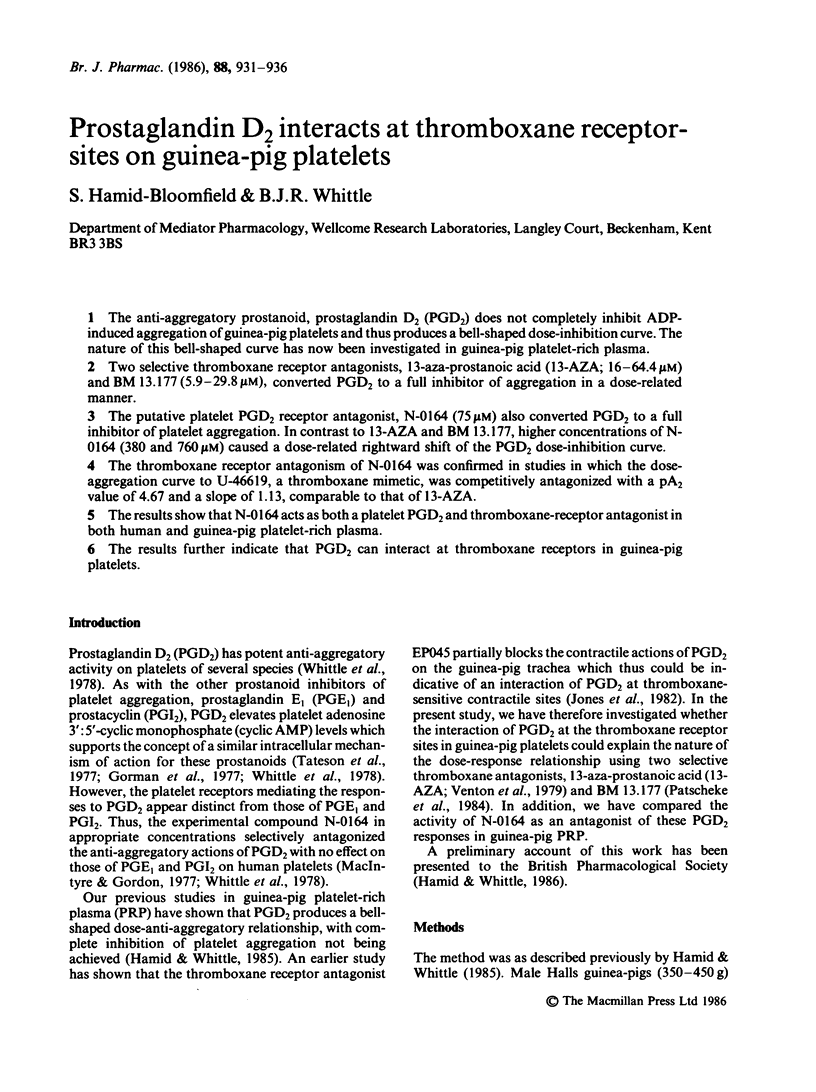
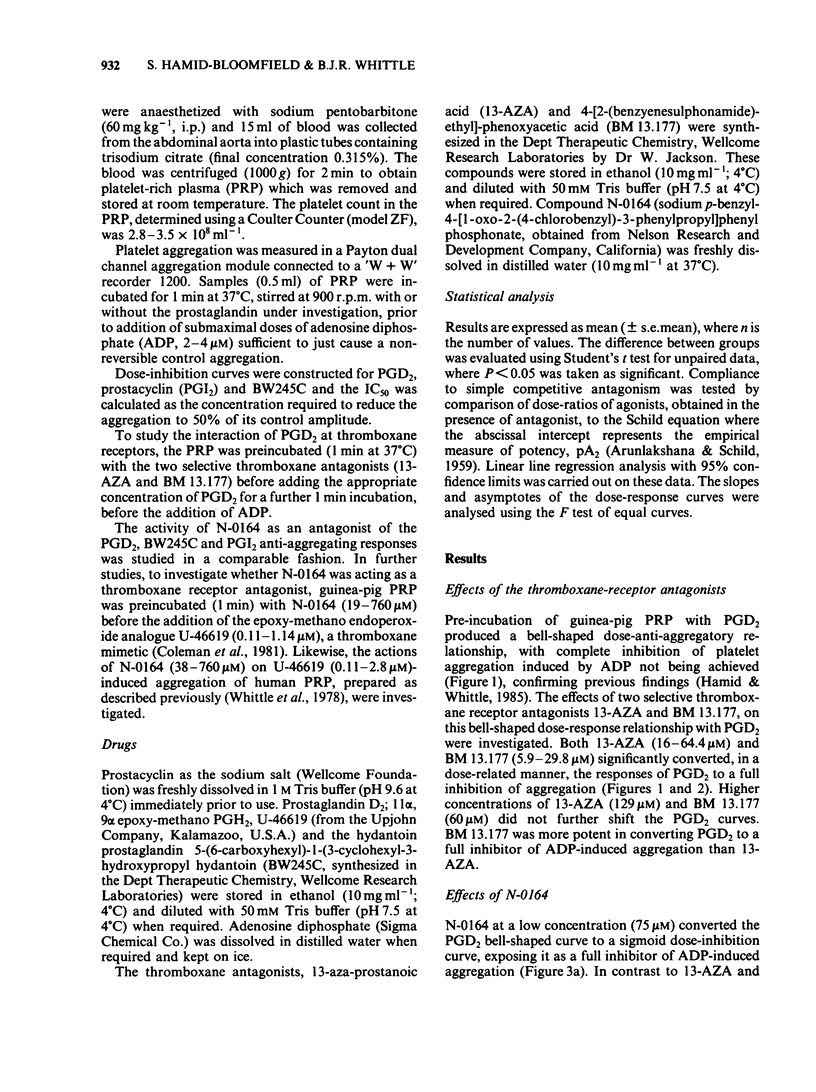
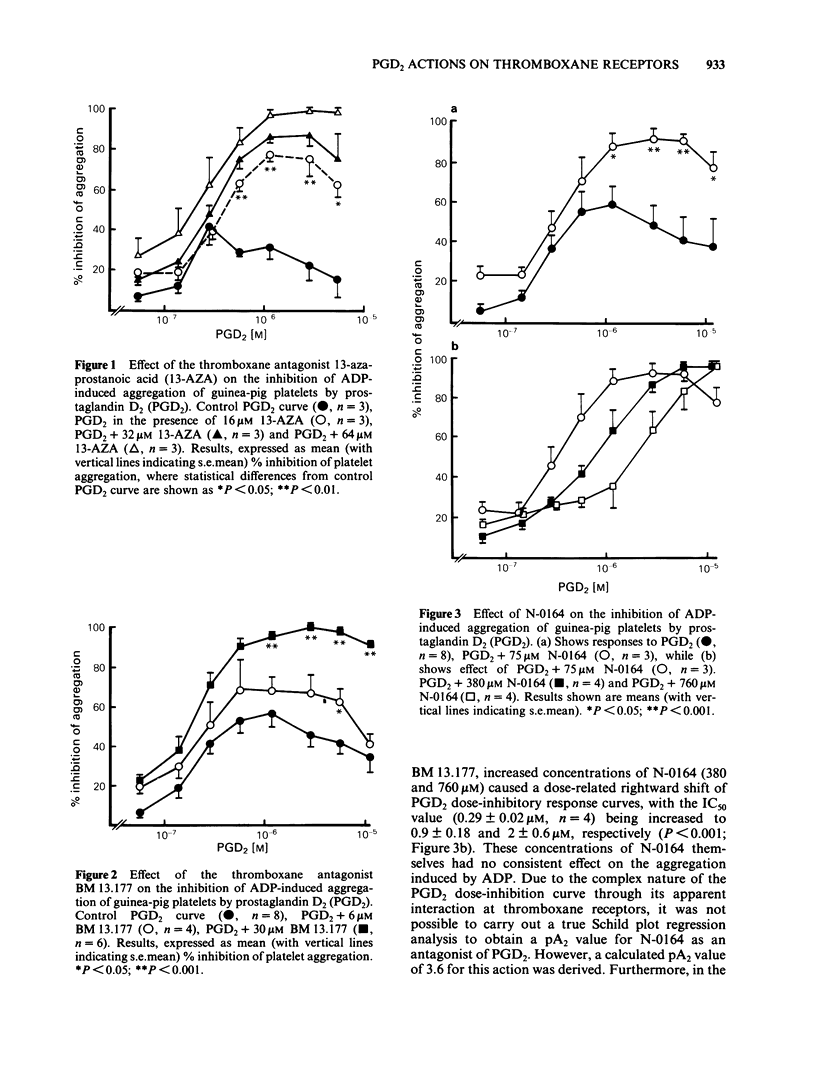
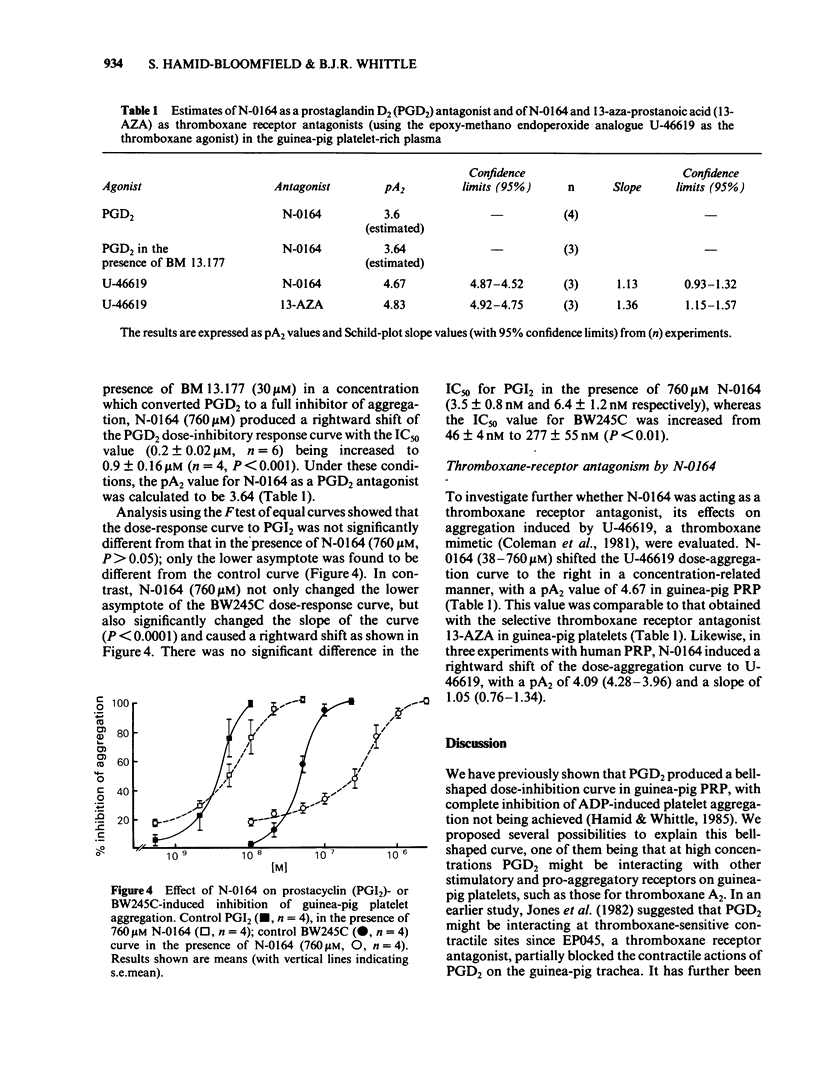
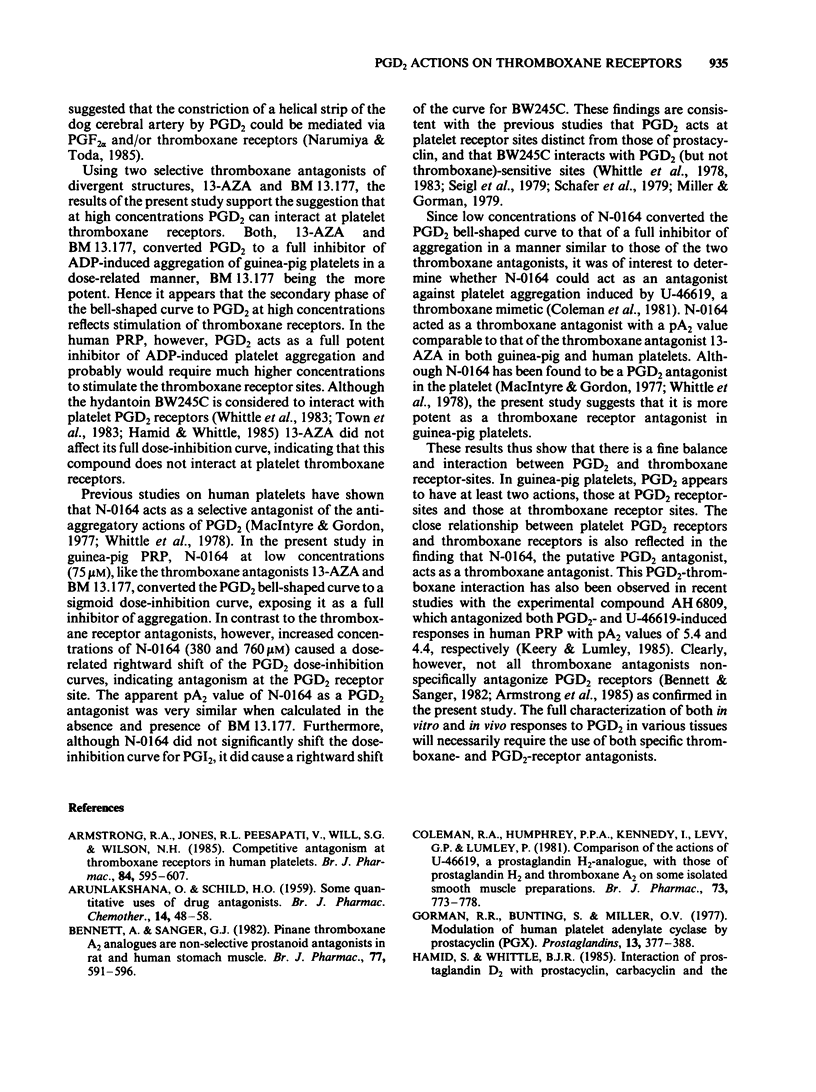
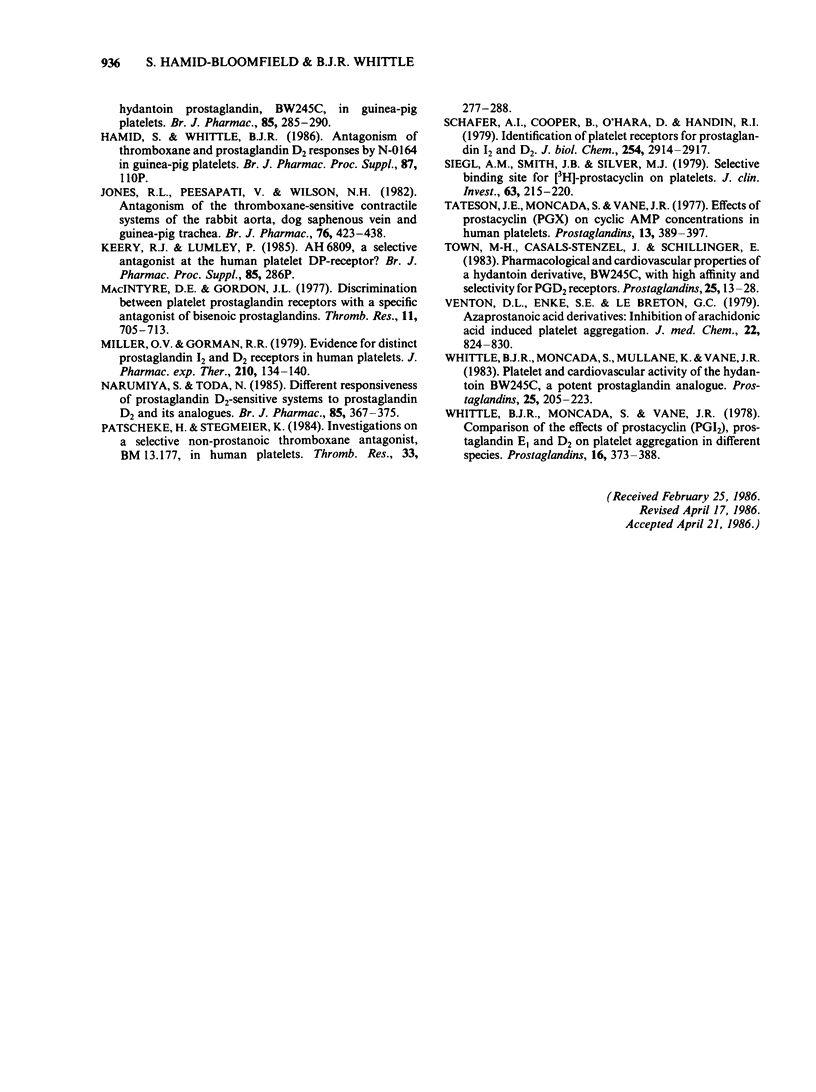
Selected References
These references are in PubMed. This may not be the complete list of references from this article.
- ARUNLAKSHANA O., SCHILD H. O. Some quantitative uses of drug antagonists. Br J Pharmacol Chemother. 1959 Mar;14(1):48–58. doi: 10.1111/j.1476-5381.1959.tb00928.x. [DOI] [PMC free article] [PubMed] [Google Scholar]
- Armstrong R. A., Jones R. L., Peesapati V., Will S. G., Wilson N. H. Competitive antagonism at thromboxane receptors in human platelets. Br J Pharmacol. 1985 Mar;84(3):595–607. doi: 10.1111/j.1476-5381.1985.tb16139.x. [DOI] [PMC free article] [PubMed] [Google Scholar]
- Bennett A., Sanger G. J. Pinane thromboxane A2 analogues are non-selective prostanoid antagonists in rat and human stomach muscle. Br J Pharmacol. 1982 Dec;77(4):591–596. doi: 10.1111/j.1476-5381.1982.tb09336.x. [DOI] [PMC free article] [PubMed] [Google Scholar]
- Coleman R. A., Humphrey P. P., Kennedy I., Levy G. P., Lumley P. Comparison of the actions of U-46619, a prostaglandin H2-analogue, with those of prostaglandin H2 and thromboxane A2 on some isolated smooth muscle preparations. Br J Pharmacol. 1981 Jul;73(3):773–778. doi: 10.1111/j.1476-5381.1981.tb16814.x. [DOI] [PMC free article] [PubMed] [Google Scholar]
- Gorman R. R., Bunting S., Miller O. V. Modulation of human platelet adenylate cyclase by prostacyclin (PGX). Prostaglandins. 1977 Mar;13(3):377–388. doi: 10.1016/0090-6980(77)90018-1. [DOI] [PubMed] [Google Scholar]
- Hamid S., Whittle B. J. Interaction of prostaglandin D2 with prostacyclin, carbacyclin and the hydantoin prostaglandin, BW245C, in guinea-pig platelets. Br J Pharmacol. 1985 May;85(1):285–290. doi: 10.1111/j.1476-5381.1985.tb08858.x. [DOI] [PMC free article] [PubMed] [Google Scholar]
- Jones R. L., Peesapati V., Wilson N. H. Antagonism of the thromboxane-sensitive contractile systems of the rabbit aorta, dog saphenous vein and guinea-pig trachea. Br J Pharmacol. 1982 Jul;76(3):423–438. doi: 10.1111/j.1476-5381.1982.tb09236.x. [DOI] [PMC free article] [PubMed] [Google Scholar]
- MacIntyre D. E., Gordon J. L. Discrimination between platelet prostaglandin receptors with a specific antagonist of bisenoic prostaglandins. Thromb Res. 1977 Dec;11(6):705–713. doi: 10.1016/0049-3848(77)90099-8. [DOI] [PubMed] [Google Scholar]
- Miller O. V., Gorman R. R. Evidence for distinct prostaglandin I2 and D2 receptors in human platelets. J Pharmacol Exp Ther. 1979 Jul;210(1):134–140. [PubMed] [Google Scholar]
- Narumiya S., Toda N. Different responsiveness of prostaglandin D2-sensitive systems to prostaglandin D2 and its analogues. Br J Pharmacol. 1985 Jun;85(2):367–375. doi: 10.1111/j.1476-5381.1985.tb08870.x. [DOI] [PMC free article] [PubMed] [Google Scholar]
- Patscheke H., Stegmeier K. Investigation on a selective non-prostanoic thromboxane antagonist, BM 13.177, in human platelets. Thromb Res. 1984 Feb 1;33(3):277–288. doi: 10.1016/0049-3848(84)90163-4. [DOI] [PubMed] [Google Scholar]
- Schafer A. I., Cooper B., O'Hara D., Handin R. I. Identification of platelet receptors for prostaglandin I2 and D2. J Biol Chem. 1979 Apr 25;254(8):2914–2917. [PubMed] [Google Scholar]
- Siegl A. M., Smith J. B., Silver M. J., Nicolaou K. C., Ahern D. Selective binding site for [3H]prostacyclin on platelets. J Clin Invest. 1979 Feb;63(2):215–220. doi: 10.1172/JCI109292. [DOI] [PMC free article] [PubMed] [Google Scholar]
- Tateson J. E., Moncada S., Vane J. R. Effects of prostacyclin (PGX) on cyclic AMP concentrations in human platelets. Prostaglandins. 1977 Mar;13(3):389–397. doi: 10.1016/0090-6980(77)90019-3. [DOI] [PubMed] [Google Scholar]
- Town M. H., Casals-Stenzel J., Schillinger E. Pharmacological and cardiovascular properties of a hydantoin derivative, BW 245 C, with high affinity and selectivity for PGD2 receptors. Prostaglandins. 1983 Jan;25(1):13–28. doi: 10.1016/0090-6980(83)90131-4. [DOI] [PubMed] [Google Scholar]
- Venton D. L., Enke S. E., Le Breton G. C. Azaprostanoic acid derivatives. Inhibitors of arachidonic acid induced platelet aggregation. J Med Chem. 1979 Jul;22(7):824–830. doi: 10.1021/jm00193a014. [DOI] [PubMed] [Google Scholar]
- Whittle B. J., Moncada S., Mullane K., Vane J. R. Platelet and cardiovascular activity of the hydantoin BW245C, a potent prostaglandin analogue. Prostaglandins. 1983 Feb;25(2):205–223. doi: 10.1016/0090-6980(83)90105-3. [DOI] [PubMed] [Google Scholar]
- Whittle B. J., Moncada S., Vane J. R. Comparison of the effects of prostacyclin (PGI2), prostaglandin E1 and D2 on platelet aggregation in different species. Prostaglandins. 1978 Sep;16(3):373–388. doi: 10.1016/0090-6980(78)90216-2. [DOI] [PubMed] [Google Scholar]


